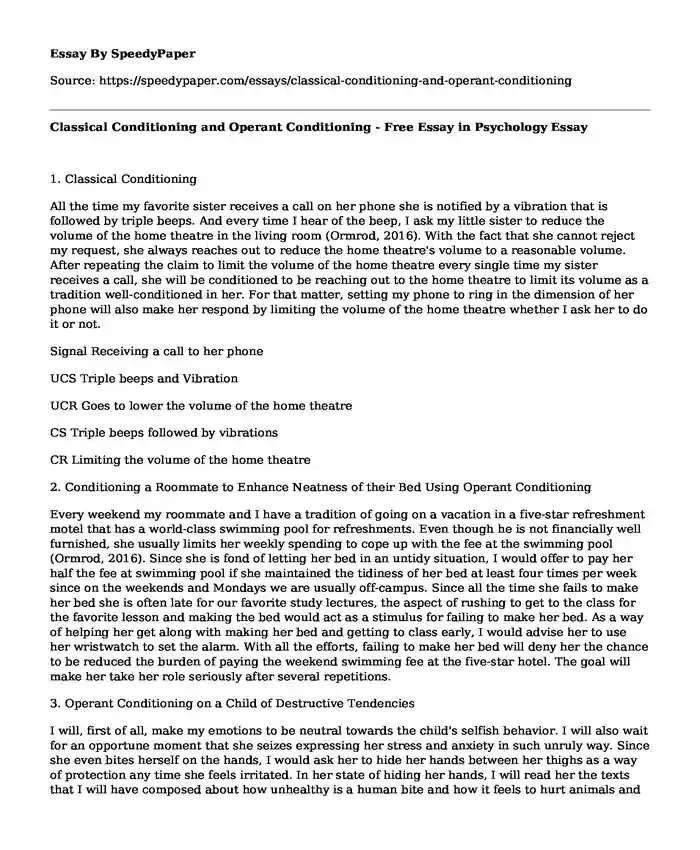
| Type of paper: | Essay |
| Categories: | Psychology |
| Pages: | 3 |
| Wordcount: | 760 words |
1. Classical Conditioning
All the time my favorite sister receives a call on her phone she is notified by a vibration that is followed by triple beeps. And every time I hear of the beep, I ask my little sister to reduce the volume of the home theatre in the living room (Ormrod, 2016). With the fact that she cannot reject my request, she always reaches out to reduce the home theatre's volume to a reasonable volume. After repeating the claim to limit the volume of the home theatre every single time my sister receives a call, she will be conditioned to be reaching out to the home theatre to limit its volume as a tradition well-conditioned in her. For that matter, setting my phone to ring in the dimension of her phone will also make her respond by limiting the volume of the home theatre whether I ask her to do it or not.
Signal Receiving a call to her phone
UCS Triple beeps and Vibration
UCR Goes to lower the volume of the home theatre
CS Triple beeps followed by vibrations
CR Limiting the volume of the home theatre
2. Conditioning a Roommate to Enhance Neatness of their Bed Using Operant Conditioning
Every weekend my roommate and I have a tradition of going on a vacation in a five-star refreshment motel that has a world-class swimming pool for refreshments. Even though he is not financially well furnished, she usually limits her weekly spending to cope up with the fee at the swimming pool (Ormrod, 2016). Since she is fond of letting her bed in an untidy situation, I would offer to pay her half the fee at swimming pool if she maintained the tidiness of her bed at least four times per week since on the weekends and Mondays we are usually off-campus. Since all the time she fails to make her bed she is often late for our favorite study lectures, the aspect of rushing to get to the class for the favorite lesson and making the bed would act as a stimulus for failing to make her bed. As a way of helping her get along with making her bed and getting to class early, I would advise her to use her wristwatch to set the alarm. With all the efforts, failing to make her bed will deny her the chance to be reduced the burden of paying the weekend swimming fee at the five-star hotel. The goal will make her take her role seriously after several repetitions.
3. Operant Conditioning on a Child of Destructive Tendencies
I will, first of all, make my emotions to be neutral towards the child's selfish behavior. I will also wait for an opportune moment that she seizes expressing her stress and anxiety in such unruly way. Since she even bites herself on the hands, I would ask her to hide her hands between her thighs as a way of protection any time she feels irritated. In her state of hiding her hands, I will read her the texts that I will have composed about how unhealthy is a human bite and how it feels to hurt animals and people's property (Ormrod, 2016). I would also read her a book by Karen Katz No Biting for better affirmation. Later in her relaxed state, I will read her the writing on the effects she causes to her beautiful teeth and property when she opts for biting a thing or herself. I would ask her to inform me of how close the dog is to her when she is irritated or ask her to move away from stock when instincts of getting annoyed to come her way. If she fails to do that, then I will spank her to show her my disguise for failing to listen to my feelings. Then I will make her sit down and communicate her thoughts to measure the effectiveness of the incident stimulus.
4. Model of Operant Conditioning Using the Five Principles of Social Learning Theory
Since most of my tasks are mental, I would image out how I will grow big and face the challenge of obesity (Ormrod, 2016, Ormrod, 2012)). I will, therefore, use social learning theory one which involves observation of how diabetic people are constrained in their life. Using the principle, I will figure out plans of working out as a way of achieving a well maintained physical body health and fitness.
References
Ormrod, J. E., (2016). Publication manual of the American Psychological Association. Washington, DC: American Psychological Association.Ormrod, J. E. (2012). Human learning. 7th Ed. New York, NY: Pearson. ISBN
Cite this page
Classical Conditioning and Operant Conditioning - Free Essay in Psychology. (2022, Mar 28). Retrieved from https://speedypaper.net/essays/classical-conditioning-and-operant-conditioning
Request Removal
If you are the original author of this essay and no longer wish to have it published on the SpeedyPaper website, please click below to request its removal:
- Masculinity - Free Essay Example
- The Big Day - Free Essay on Art Therapy
- Free Essay: Walt Disney CSR Organizational Profile
- The Feet of Spring Are on Stair - Poem Analysis Essay Sample
- Analysis of Value and Need as Organizing Factors in Perception, Article Review Essay Sample
- Free Essay on Human Resource Management and Its Five Functional Areas
- Essay Example: Performance Management Questions
Popular categories




